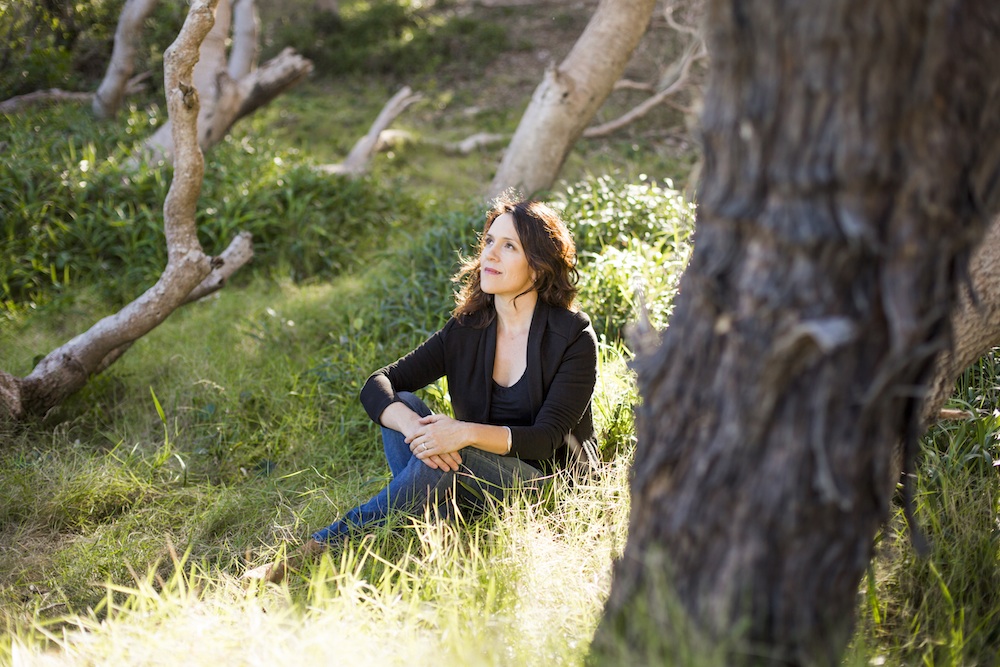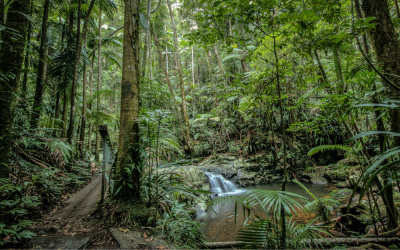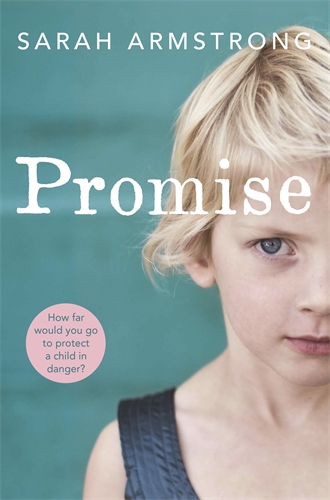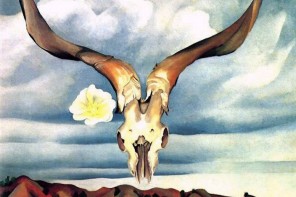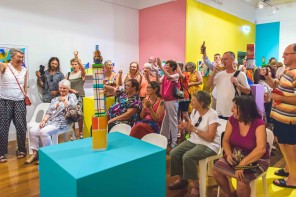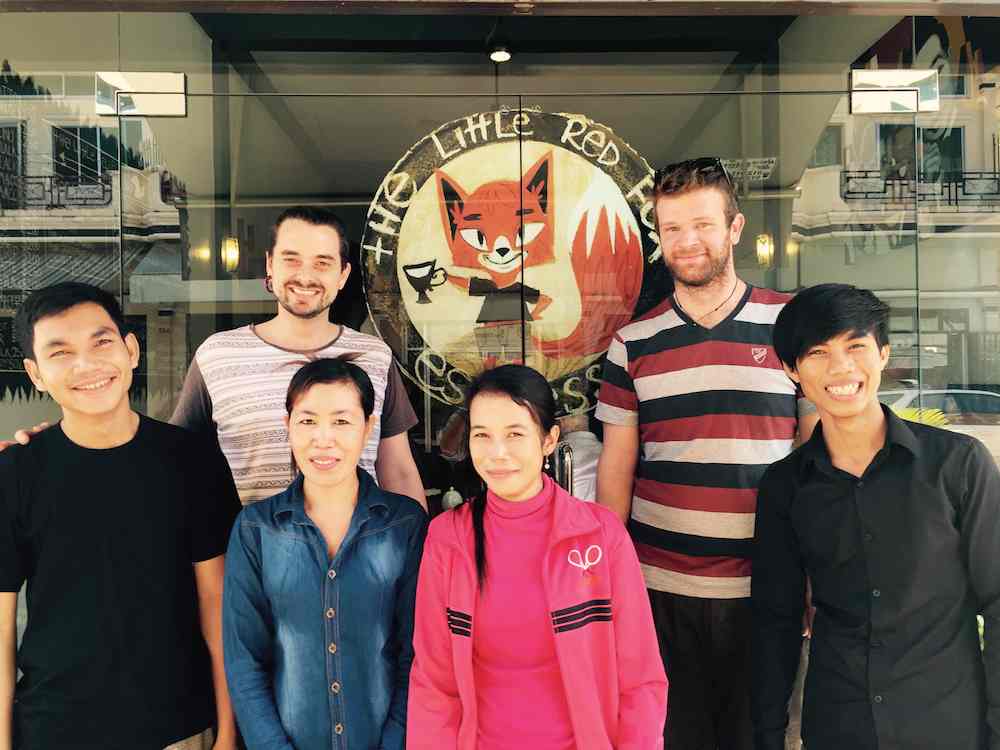Sarah Armstrong’s novel, Promise, was published this week. Sarah charts the birth of her latest book – which asks how far you would go to protect a child in danger. She also explores the mysterious lure of the remote valley she first lived in when she moved from Sydney to Byron.
The month I started work on my first novel, I moved from a small Sydney apartment to a ramshackle cottage in a rainforest valley near Mullumbimby. Tall trees reached their branches over our roof, and at night we could hear animals – possums, bandicoots, pademelons – rustling around in the forest just twenty metres away. Not long after we moved in, it started to rain. And didn’t stop for three months.
The landscape and the rain – perhaps predictably – found their way into my book; Salt Rain featured lots of dripping forests and red mud and creeks rising over causeways.
After a couple of years I left the valley – because my marriage ended – and moved to the coast, near Byron.That was sixteen years ago and since then I’ve lived down on the plain, mostly in the township of Mullumbimby. But I can’t seem to stop writing about the valley. It has featured in all three of my novels and in several stories. Now – about to embark on my fourth novel – I’m trying to understand what it is about the hills that has so captured my imagination.
* * * * * *
I grew up in Armidale, New South Wales – sheep country with distant blue hills and vast open paddocks. When my family would drive to the coast for a camping holiday, I avoided looking out the window at the dry paddocks and sparse eucalypts because something about them made my stomach feel hollow. I longed for the lush, dense vegetation of Valla Beach where we were headed.
In my new novel, Promise (set largely in the hills around Mullumbimby), my protagonist, Anna, walks into a forest:
The dirt path was narrow and wound between the tall trees. All around, the air was wet and loamy, and rain dripped from the forest canopy above, the droplets bouncing the big leaves and making the delicate ferns shiver. It was such a benign landscape. No, it was more than benign, it was abundant and cocooning. Which was why she was desperate to stay and not head out into open country.
Anna once read that people were meant to be feel most at home in the landscape of their childhood, but she found the countryside around Orange uninviting.
Here, the forest burst with life, everything moist and fertile, vines looping from tree to tree, ferns and palms sprouting from the smallest crevice. When she was nineteen and Pat first drove her up into the hills in his old van, the forest getting denser around them by the minute, the thought kept running through her head, I’ve come home, I’ve come home.
While not autobiographical, my novels inevitably explore ideas that fascinate and preoccupy me. Like Anna, when I first drove up into the hills behind Mullumbimby, in a real estate agent’s leather-seated car, I had the sense of returning home.
My then-husband Matt and I bought the one-bedroom cottage the real estate agent showed us. I left my job at the ABC, we followed the removal truck up the highway and set to work painting the cottage, building a deck and planting a vegetable garden.
I can still conjure clear memories from that January, of walking down to the waterhole each afternoon, along the winding dirt road, past the hillside of palms, to the burbling, boulder-strewn creek. Sweaty and tired after working on the house, we would sink into the cool, earthy-smelling water. The creek rushed over a lip of rock into the big still pool where I floated on my back, looking up to the trees circling the waterhole, their branches silhouetted against the sky. I felt protected and contained by the trees and the valley walls, and by the quiet. It was unfathomable that my friends and colleagues were – at that very moment – driving through traffic in Sydney, and rushing to story deadlines at the ABC. Up in the hills, I felt outside time. Like I’d entered a magical realm.
When the rains came, we learned to keep working outside even as it bucketed down, we learned to navigate the slippery red mud, and to stock up the pantry in case the creek crossings went under or a tree fell over the road. Neighbours told me stories of having to walk for hours through the bush to reach town for urgently needed medication, and I heard of flying foxes used to cross flooded creeks and cars washed off the causeways. There was something thrilling about being cut off from the rest of the world, about having a heightened awareness of the weather and landscape.
I suspect that sense of the thrilling is one reason why the hills hold a special significance for me. There’s a profound appeal in the idea of being self sufficient and beyond the usual demands of society.
I also felt in contact with nature there in a way that I’ve not experienced since. Nature is dramatic and unavoidable in the hills. Trees crash in the forest, flooded creeks tumble boulders about like marbles, and all around are snakes and leeches and ticks. Before my eyes I saw nature reclaiming its land, land that had long ago been cleared by white settlers for logging, then banana plantations and dairy farming.
Anna knew there were hundreds of houses tucked into the folds of the valleys around here. The farmers had sold out to hippies who built ramshackle homes from secondhand materials and lost control of the weeds, especially the lantana. The seed bank in the soil had sprouted with native trees and exotics like camphor laurel, and now the hills were thick with trees again. Most of the houses Anna had visited the year she spent with Pat had been unlined or works-in-progress. She’d found it very romantic, the idea of crafting your own home, forging your own way, not following someone else’s ideas of a successful life. This secluded valley was now a perfect place for Anna and Charlie to hide.
Perhaps, above all, the valley was a place for me to retreat from the world and from a busy, deadline-driven life. At times, these days – my time consumed by mothering and writing and running a house with my partner, Alan – I long for a simpler, quieter life, hidden away among the trees. But, interestingly, I rarely visit the valley (and I live only twenty minutes away) and have never contemplated returning to live there. Maybe I don’t need to visit. Maybe it lives more powerfully and magically in my imagination; maybe it’s taken on a life of its own there. Sometimes I wonder if the people who live in the valley now might not recognise my version of it.
It was the most exhilarating landscape I’ve lived in, and I think I continue to write about it because when a landscape exerts a powerful influence on a character, the writer has more scope for drama and tension. Perhaps, too, I simply enjoy taking myself back to the particular magic and intensity of that time of my life, when I left the city, found my home, and started on my writing career.
Promise, by Sarah Armstrong, published by Pan Macmillan, paperback, 400 pp, rrp $32.99
When a new family moves in next door, it takes Anna just two days to realise that something is very wrong. She can hear their five-year old daughter Charlie crying, then sees injuries on the little girl that she cannot ignore. Anna reports the family to police and community services, but no one comes to Charlie’s aid.
So when the girl turns up at her door asking for help, the only thing Anna can think to do is take her and run. Raising deeply felt questions about our responsibility for the children around us, Promise asks: if Charlie were my neighbour, what would I do?

